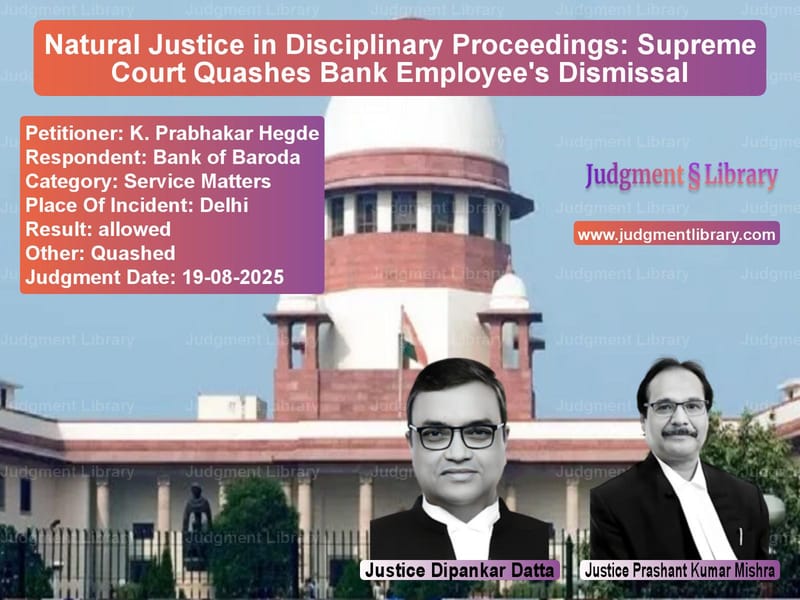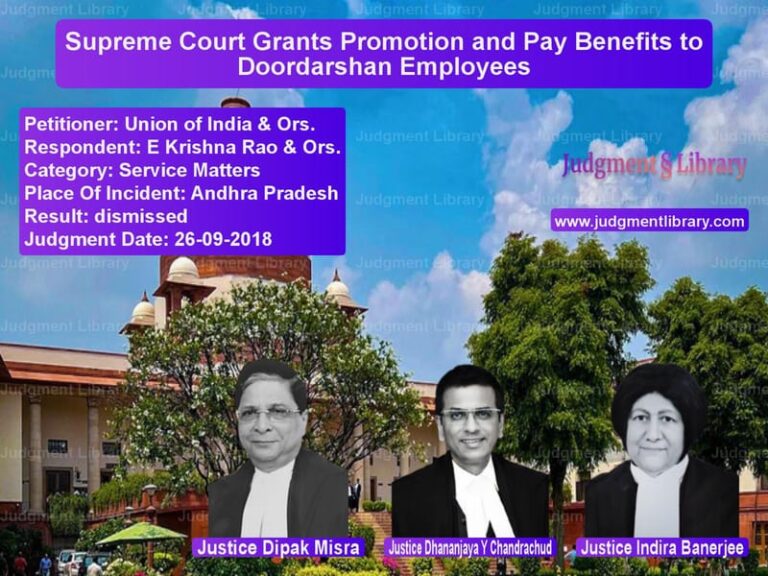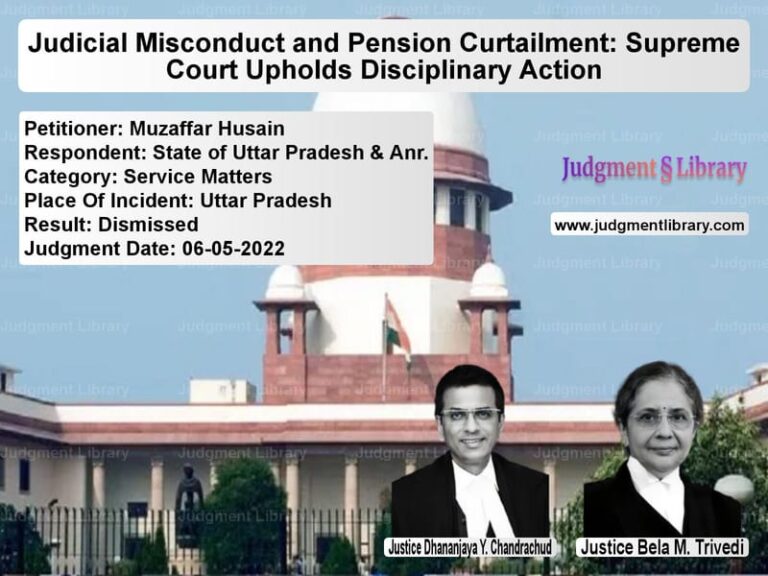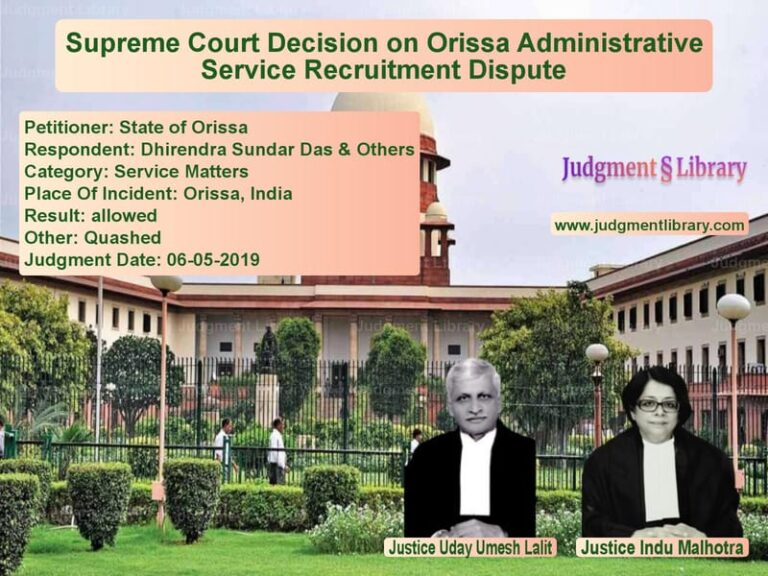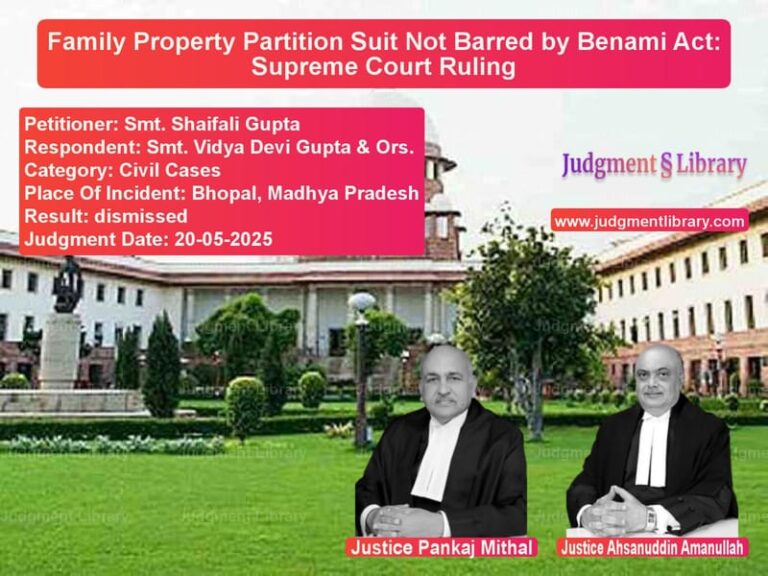Natural Justice in Disciplinary Proceedings: Supreme Court Quashes Bank Employee’s Dismissal
In a landmark judgment that reinforces the fundamental importance of natural justice in disciplinary proceedings, the Supreme Court of India recently delivered a significant verdict favoring a bank employee who had been dismissed from service after decades of employment. The case of K. Prabhakar Hegde versus Bank of Baroda represents a crucial examination of procedural safeguards available to employees facing disciplinary action and the mandatory nature of regulations designed to ensure fair treatment. The judgment, delivered by a bench comprising Justice Dipankar Datta and Justice Prashant Kumar Mishra, delves deep into the principles of natural justice and their application in service matters, particularly focusing on the rights of employees during departmental inquiries.
The legal battle began when K. Prabhakar Hegde, who had joined Vijaya Bank in 1959 and risen to the position of Zonal Head of the Delhi Zonal Office, faced disciplinary proceedings in 1999. The allegations against him concerned irregularities in approving temporary overdrafts for various parties. After a prolonged inquiry process that continued even after his superannuation, he was ultimately dismissed from service in 2002. This dismissal was challenged through various legal forums, eventually reaching the Supreme Court, where several critical legal questions about procedural fairness were examined.
The Core Legal Issues
The Supreme Court identified three primary issues for determination in this case. First, whether the denial of the preliminary inquiry report to the appellant vitiated the regular inquiry that followed. Second, whether the failure of the Inquiry Officer to generally question the appellant on the circumstances appearing against him in the evidence, as required by Regulation 6(17) of the Vijaya Bank Officer Employees’ (Discipline and Appeal) Regulations, 1981, rendered the inquiry invalid. Third, whether continuation of disciplinary proceedings against the appellant beyond superannuation was permissible under the 1981 Regulations.
The Court’s analysis of these issues revealed significant procedural lapses that ultimately determined the outcome of the case. On the first issue regarding the preliminary inquiry report, the Court established clear principles based on precedent cases. Quoting from Krishna Chandra Tandon v. Union of India, the Court noted: “It is very necessary for an authority which orders an enquiry to be satisfied that there are prima facie grounds for holding a disciplinary enquiry and, therefore, before he makes up his mind he will either himself investigate or direct his subordinates to investigate in the matter… these documents of the nature of inter-departmental communications between officers preliminary to the holding of enquiry have really no importance unless the Enquiry Officer wants to rely on them for his conclusions.”
The Court further elaborated on the purpose of preliminary inquiries by referencing Champaklal Chimanlal Shah v. Union of India: “Generally therefore a preliminary enquiry is usually held to determine whether a prima facie case for a formal departmental enquiry is made out, and it is very necessary that the two should not be confused.” Based on these principles, the Court concluded that since the inquiry officer had not relied upon the preliminary inquiry report in reaching his conclusions, non-furnishing of this report to the appellant was inconsequential and did not cause any prejudice.
The Critical Failure of Natural Justice
The most significant aspect of the judgment concerned the interpretation of Regulation 6(17) of the 1981 Regulations, which requires the Inquiry Officer to question the charged officer on circumstances appearing against him in the evidence. The Court conducted an extensive analysis of this provision and its implications for natural justice. The regulation states that the Inquiry Officer “may, after the completion of the production of evidence, generally question the charged officer on the circumstances appearing against him in the evidence for the purpose of enabling the charged officer to explain any such circumstances.”
The Court made a crucial distinction between the discretionary and mandatory aspects of this regulation. It observed: “Interestingly, Regulation 6(17) as well as Rule 8(19) refers to both ‘may’ and ‘shall’. While the first part of Regulation 6(17) refers to ‘may’, the second part refers to ‘shall’. The use of ‘may’ and ‘shall’ in the same provision does imply that Regulation 6(17) means what it says. The words ‘may’ and ‘shall’ have been used to mean ‘may’ and ‘shall’, respectively, and we cannot possibly conceive of any rule of construction which would lead us to assume that the framers intended that ‘shall’ in the second part of Regulation 6(17) should also be read and understood as ‘may’.”
This interpretation led the Court to conclude that “while the first part of Regulation 6(17) is directory, the second part thereof is mandatory.” The Court emphasized the importance of this procedural safeguard by stating: “We, therefore, unhesitatingly hold that the Inquiry Officer by not generally questioning the appellant on the circumstances available in the evidence, which were unfavourable or adverse to such officer, failed to perform a mandatory duty. Any such circumstance, which was unfavourable or adverse to the appellant, should have been excluded from the Inquiry Officer’s consideration.”
The Prejudice Principle Reexamined
The judgment represents a significant evolution in the Court’s approach to the “prejudice principle” in natural justice cases. The respondent had relied heavily on the precedent set in Sunil Kumar Banerjee v. State of West Bengal, which had held that failure to comply with similar procedural requirements did not vitiate the inquiry unless the delinquent officer could establish prejudice. However, the current bench found this approach inconsistent with contemporary understanding of natural justice principles.
The Court referenced several Constitution Bench decisions that have shaped the understanding of natural justice in Indian jurisprudence. Quoting from S.L. Kapoor v. Jagmohan, the Court noted: “In our view the principles of natural justice know of no exclusionary rule dependent on whether it would have made any difference if natural justice had been observed. The non-observance of natural justice is itself prejudice to any man and proof of prejudice independently of proof of denial of natural justice is unnecessary. It ill comes from a person who has denied justice that the person who has been denied justice is not prejudiced.”
This perspective was reinforced by references to Olga Tellis v. Bombay Municipal Corporation and A.R. Antulay v. R.S. Nayak, where the Court had held that “No prejudice need be proved for enforcing the fundamental rights. Violation of a fundamental right itself renders the impugned action void. So also the violation of the principles of natural justice renders the act a nullity.”
The Court explained its departure from the prejudice principle established in earlier cases by noting: “With the utmost respect and reverence at our command for the three-Judge Bench that had the occasion to decide Sunil Kumar Banerjee, our analysis of the legal position reveals that the precedential value of the said decision stands significantly diminished for reasons more than one… the vast and expansive development of law in the field of administrative law in our country since the time Sunil Kumar Banerjee was decided, especially on the rule of fairness in administrative action which is now acknowledged in the Indian context as the third limb of natural justice, cannot be overlooked.”
The CVC Recommendation Controversy
Another significant aspect of the case concerned the role of the Central Vigilance Commission (CVC) in the disciplinary process. The Court found that the disciplinary authority had initially proposed compulsory retirement as punishment, but after receiving a recommendation from the CVC, changed the punishment to dismissal. Crucially, this CVC recommendation was never provided to the appellant, denying him an opportunity to respond to it.
The Court strongly condemned this practice, referencing its earlier decision in SBI v. D.C. Aggarwal: “When the disciplinary authority accepts the recommendation of the CVC which is at variance with the original proposal of the disciplinary authority, it is incumbent upon the authority to furnish a copy of the CVC recommendation to the charged employee before acting on such recommendation.”
The Court rejected the bank’s claim of privilege over the CVC recommendation, stating: “We are inclined to the view that the claim of privilege was utterly misconceived. The recommendation of the CVC did not have anything to do with the ‘affairs of the State’ or, if one were not to be guided by Section 123 of the Evidence Act, anything to do with national security.”
The Final Judgment and Relief
Considering the appellant’s advanced age (he was noted to be an octogenarian) and the considerable passage of time since the disciplinary proceedings, the Court decided against remanding the case for fresh inquiry. Instead, it crafted a balanced relief that acknowledged both the procedural violations and the practical realities of the situation.
The Court ordered: “the appellant shall not be entitled to any terminal benefits except to the extent indicated hereafter; he shall only be entitled to a lump-sum amount equal to the quantum of gratuity which would have been payable to him had he not been fastened with the order of dismissal; such lump-sum amount may be released in favour of the appellant within a period of eight weeks from date; no amount on account of interest shall be payable to the appellant on the said amount; however, interest @ 9% p.a. shall be payable on such amount if not released within the period stipulated above; and the order of dismissal, in the circumstances, shall stand quashed.”
This judgment represents a significant reinforcement of procedural safeguards in disciplinary proceedings and underscores the judiciary’s commitment to ensuring that principles of natural justice are not diluted by technical interpretations. By emphasizing that certain procedural requirements are mandatory rather than directory, and by moving away from the requirement to demonstrate specific prejudice in natural justice violations, the Supreme Court has strengthened the protection available to employees facing disciplinary action. The decision serves as an important reminder to all disciplinary authorities about the necessity of scrupulously following prescribed procedures and ensuring that employees are given a genuine opportunity to defend themselves against allegations.
Petitioner Name: K. Prabhakar Hegde.Respondent Name: Bank of Baroda.Judgment By: Justice Dipankar Datta, Justice Prashant Kumar Mishra.Place Of Incident: Delhi.Judgment Date: 19-08-2025.Result: allowed.
Don’t miss out on the full details! Download the complete judgment in PDF format below and gain valuable insights instantly!
Download Judgment: k.-prabhakar-hegde-vs-bank-of-baroda-supreme-court-of-india-judgment-dated-19-08-2025.pdf
Directly Download Judgment: Directly download this Judgment
See all petitions in Employment Disputes
See all petitions in Disciplinary Proceedings
See all petitions in Termination Cases
See all petitions in Public Sector Employees
See all petitions in Pension and Gratuity
See all petitions in Judgment by Dipankar Datta
See all petitions in Judgment by Prashant Kumar Mishra
See all petitions in allowed
See all petitions in Quashed
See all petitions in supreme court of India judgments August 2025
See all petitions in 2025 judgments
See all posts in Service Matters Category
See all allowed petitions in Service Matters Category
See all Dismissed petitions in Service Matters Category
See all partially allowed petitions in Service Matters Category

